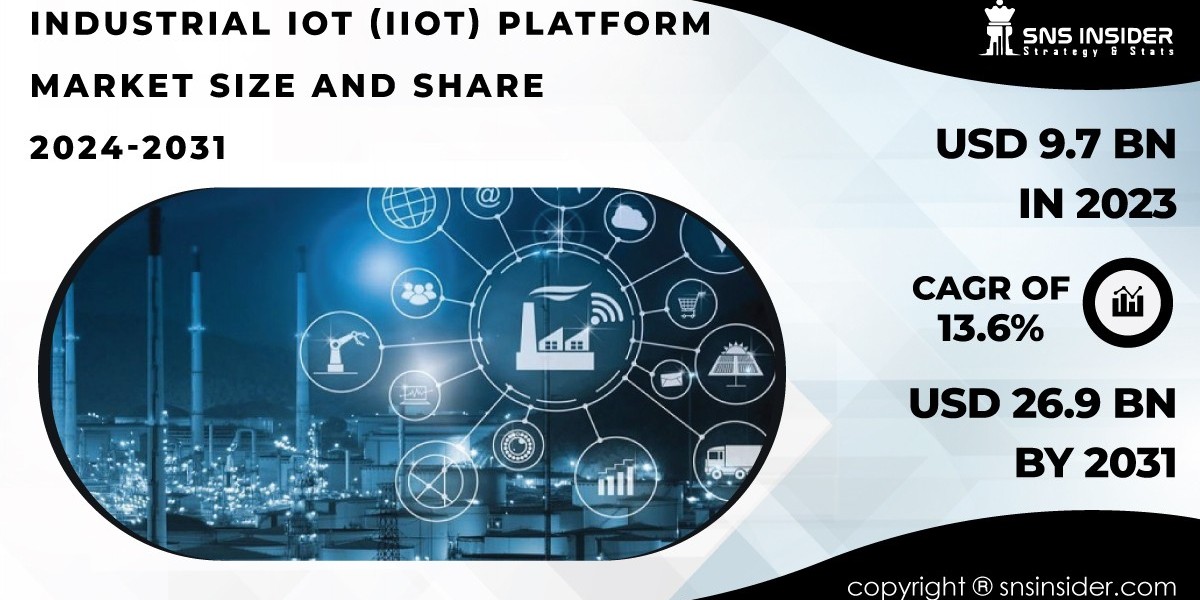Industrial IoT Platform 2024
The Industrial Internet of Things (IIoT) represents a transformative shift in how industries operate, leveraging interconnected devices and data analytics to enhance efficiency, productivity, and decision-making. At the heart of this revolution are Industrial IoT platforms, which serve as the backbone for connecting machinery, sensors, and devices across various sectors, including manufacturing, energy, logistics, and more. With the Industrial IoT Platform Market Share growing rapidly, the market was valued at USD 9.7 billion in 2023 and is expected to reach USD 30.56 billion by 2032, growing at a CAGR of 13.6% between 2024 and 2032.
These platforms facilitate the integration of industrial devices and enable the collection, processing, and analysis of vast amounts of data generated in real time. By creating a cohesive ecosystem that connects different components of an industrial environment, IIoT platforms allow organizations to optimize operations, reduce costs, and drive innovation. As industries increasingly adopt automation and digitization, the role of IIoT platforms becomes even more critical in shaping the future of industrial operations.
Understanding Industrial IoT Platforms
An Industrial IoT platform is a comprehensive software solution that enables organizations to manage their industrial processes through data-driven insights. These platforms connect various devices, machines, and sensors, allowing them to communicate and share data seamlessly. The architecture of an IIoT platform typically comprises several key components, including device management, data ingestion, analytics, and visualization tools.
Device management allows organizations to onboard, configure, and monitor devices connected to the platform. This functionality ensures that all devices are functioning optimally and can be remotely controlled or updated as needed. Data ingestion is another crucial aspect, as it involves collecting data from numerous sources, including sensors, machines, and enterprise applications. This data can be structured or unstructured and may include everything from machine performance metrics to environmental conditions.
The analytics component of an IIoT platform is where the real value lies. Advanced analytics tools enable organizations to derive actionable insights from the vast amounts of data collected. Predictive analytics, for instance, can help anticipate equipment failures before they occur, allowing for proactive maintenance and minimizing downtime. Visualization tools present these insights in an accessible format, empowering decision-makers to understand complex data and make informed choices.
Benefits of Industrial IoT Platforms
One of the primary advantages of adopting an Industrial IoT platform is the enhanced visibility it provides into operations. By collecting and analyzing data from various sources, organizations gain a holistic view of their processes. This visibility enables them to identify inefficiencies, bottlenecks, and areas for improvement. For example, manufacturers can monitor production lines in real time, ensuring optimal performance and identifying potential issues before they escalate.
Additionally, IIoT platforms facilitate improved decision-making. With real-time data at their fingertips, managers can make informed decisions based on accurate and up-to-date information. This capability is especially beneficial in industries where rapid response times are critical, such as energy management or logistics. By leveraging data-driven insights, organizations can optimize their resource allocation, reduce operational costs, and enhance overall productivity.
The ability to integrate with existing systems and technologies is another significant advantage of Industrial IoT platforms. Many organizations have invested heavily in legacy systems and equipment, and a robust IIoT platform can bridge the gap between old and new technologies. By enabling interoperability, these platforms allow companies to leverage their existing assets while still taking advantage of the benefits of IoT.
Furthermore, IIoT platforms enhance safety and compliance within industrial environments. By continuously monitoring equipment and processes, organizations can identify potential hazards and implement corrective measures. For instance, in the manufacturing sector, real-time monitoring of machinery can help prevent accidents and ensure compliance with safety regulations.
Challenges and Considerations
Despite the numerous benefits, the adoption of Industrial IoT platforms does not come without challenges. One of the most significant hurdles is the complexity of integration. Organizations may struggle to connect various devices, sensors, and legacy systems to a single platform, leading to potential data silos. Ensuring interoperability and seamless communication between diverse devices can be a complex undertaking, requiring specialized expertise and resources.
Data security is another critical concern. As more devices become connected, the risk of cyberattacks increases. Industrial environments often contain sensitive data and proprietary information, making them attractive targets for malicious actors. Organizations must prioritize robust security measures, including encryption, access controls, and regular security audits, to safeguard their IIoT networks.
Moreover, organizations must also consider the scalability of their chosen IIoT platform. As businesses grow and evolve, their needs may change, requiring the platform to adapt accordingly. Investing in a scalable solution ensures that organizations can expand their IIoT initiatives without having to overhaul their entire system.
Future Trends in Industrial IoT Platforms
As the IIoT landscape continues to evolve, several trends are shaping the future of Industrial IoT platforms. One of the most prominent trends is the increasing adoption of edge computing. Edge computing allows data to be processed closer to its source, reducing latency and bandwidth usage. By leveraging edge computing, organizations can enhance their real-time analytics capabilities and make faster decisions based on local data.
Artificial intelligence (AI) and machine learning (ML) are also playing a crucial role in the evolution of IIoT platforms. By integrating AI and ML algorithms, organizations can automate data analysis, improve predictive maintenance, and optimize operations. These technologies enable platforms to learn from historical data, providing more accurate insights and predictions over time.
Another trend is the rise of platform-as-a-service (PaaS) solutions within the IIoT space. PaaS offerings provide organizations with the flexibility to develop and deploy their IoT applications without investing heavily in infrastructure. This approach allows businesses to innovate rapidly and customize their IIoT solutions to meet specific needs.
Furthermore, sustainability is becoming an increasingly important consideration in the design and implementation of IIoT platforms. As industries seek to reduce their environmental impact, IIoT solutions can help optimize resource usage, minimize waste, and enhance energy efficiency. By monitoring energy consumption and emissions in real time, organizations can make informed decisions that contribute to their sustainability goals.
Conclusion
The Industrial IoT platform represents a transformative force in the industrial landscape, empowering organizations to harness the power of data and connectivity. By providing enhanced visibility, improved decision-making, and the ability to integrate existing systems, IIoT platforms are driving efficiency and innovation across various sectors. However, organizations must navigate challenges related to integration, security, and scalability to fully realize the benefits of these platforms.
As the Industrial IoT platform market continues to grow, fueled by advancements in technology and an increasing demand for connectivity, businesses that embrace this evolution will be better positioned to thrive in an increasingly competitive landscape. The future of industrial operations is undoubtedly tied to the capabilities and innovations offered by IIoT platforms, making them essential for organizations looking to enhance their operations and remain at the forefront of their industries.
Contact Us:
Akash Anand – Head of Business Development & Strategy
info@snsinsider.com
Phone: +1-415-230-0044 (US) | +91-7798602273 (IND)
About Us
SNS Insider is one of the leading market research and consulting agencies that dominates the market research industry globally. Our company's aim is to give clients the knowledge they require in order to function in changing circumstances. In order to give you current, accurate market data, consumer insights, and opinions so that you can make decisions with confidence, we employ a variety of techniques, including surveys, video talks, and focus groups around the world.
Read Our Other Reports:








